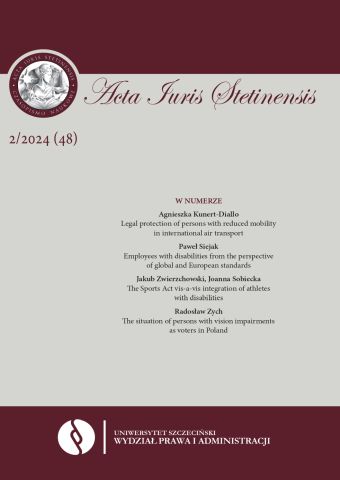The Sports Act vis-a-vis integration of athletes with disabilities
The Sports Act vis-a-vis integration of athletes with disabilities
Author(s): Jakub Zwierzchowski, Joanna SobieckaSubject(s): Politics / Political Sciences, Politics, Law, Constitution, Jurisprudence, Human Rights and Humanitarian Law, Welfare systems, Labour and Social Security Law
Published by: Wydawnictwo Naukowe Uniwersytetu Szczecińskiego
Keywords: integration; sports law; Polish sports association; Paralympics; athletes with disabilities
Summary/Abstract: In the past, sports activity mainly served as a means of rehabilitation for persons with disabilities (PWDs), leading to sports’ organizational structures to be limited primarily to athletes with disabilities (AWDs). Today, given the professionalization of adaptive sports, sports activity may also be a source of income. This, however, brings implications for forming adequate organizational structures that ensure achievement of best sports results and integration. Integration of PWDs is a process aimed at including them in the community life of persons with disabilities and opening the circles of able-bodied persons to PWDs. Given the above, in 2010 the Sports Act started to move away from the discriminating division between sports for “the able-bodied” and for “persons with disabilities”. At the moment, AWDs are subject to the same regulations as other athletes and efforts are made to involve them in competitive sports on the same terms and within the same organizational structures. The aim of this study is to see if the adopted model of organizational structures in professional (Olympic and Paralympic) has significance for the sense of integration from the perspective of AWDs. To answer this question, provisions of the Sports Act that regulate the creation of Polish sports associations (PSAs) are analysed. Results of the analysis are juxtaposed with empirical research used for expert opinions for the Ministry of Sports and Tourism, which covered 613 Paralympic athletes. Sociological, including statistical, methods are used for the analysis of empirical research. The study employs the method of investigation of the law in force to analyse provisions of the Sports Act, relying on rulings of administrative courts and legislative materials. In the light of opinions of AWDs affiliated in PSAs dedicated to training both able-bodied athletes and AWDs, different opinions are observed on the sense of integration in sports when compared with opinions of AWDs affiliated in associations dedicated solely to training AWDs. Even though the Sports Act does not have a direct and literal proof for PSA’s integrational character, interpretation of provisions by administrative authorities and their application by courts suggests otherwise. Therefore, it can be concluded that legislative changes regarding the model of PSAs, which organizes competition for both able-bodied and AWDs brings positive results in terms of integration.
Journal: Acta Iuris Stetinensis
- Issue Year: 2024
- Issue No: 48 (2)
- Page Range: 123-143
- Page Count: 21
- Language: English

